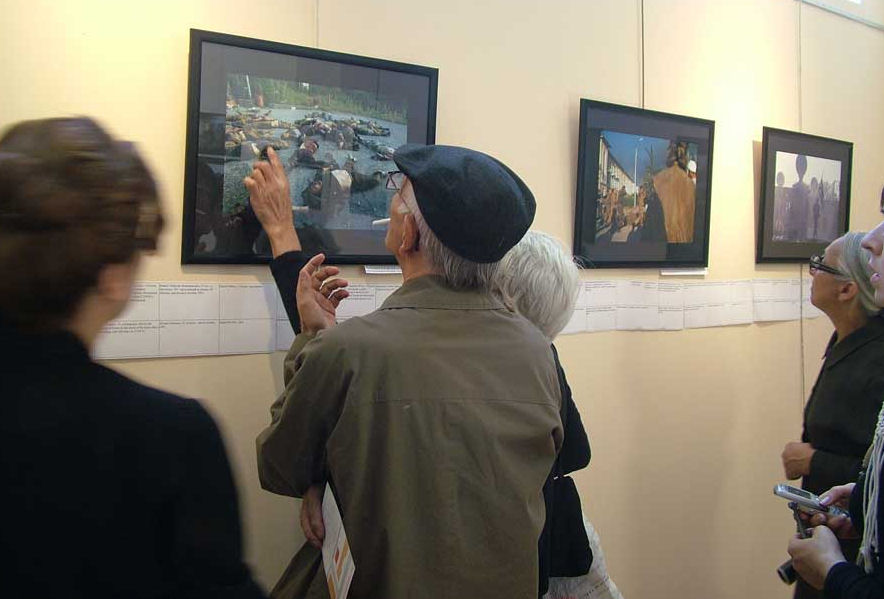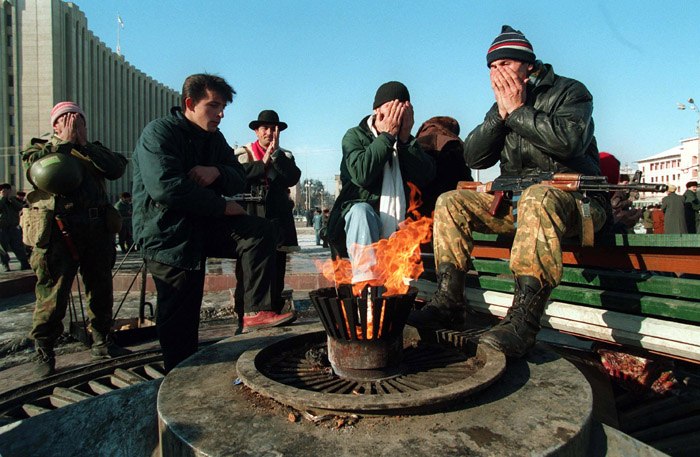|
Ethnic Cleansing Of Georgians In Sukhumi
The Sukhumi massacre took place on September 27, 1993, during and after the fall of Sukhumi into separatist hands in the course of the War in Abkhazia. It was perpetrated against Georgian civilians of Sukhumi, mainly by militia forces of Abkhaz separatists and North Caucasian allies. It became part of a violent ethnic cleansing campaign carried out by the separatists. Events On September 27, 1993, separatist forces violated the ceasefire initiated by the United Nations and guaranteed by the Russian Federation, which barred both sides from performing military operations. As part of the ceasefire, Georgian forces had withdrawn their heavy artillery and tanks from Sukhumi. Abkhaz, Confederation of Mountain Peoples of the Caucasus and Cossack militants stormed Sukhumi early in the morning. Confronted by large numbers of combatants, the Georgian army units that remained in the city were unable to prevent the separatist advance into the city. By noon, separatist militants and t ... [...More Info...] [...Related Items...] OR: [Wikipedia] [Google] [Baidu] |
War In Abkhazia (1992–1993)
The War in Abkhazia was fought between Georgian government forces for the most part and Abkhaz separatist forces, Russian government armed forces and North Caucasian militants between 1992 and 1993. Ethnic Georgians who lived in Abkhazia fought largely on the side of Georgian government forces. Ethnic Armenians and Russians within Abkhazia's population largely supported the AbkhaziansAbkhazia Today. ''The International Crisis Group Europe Report N°176, 15 September 2006, page 5''. Retrieved on 30 May 2007. ''Free registration needed to view full report'' and many fought on their side. The separatists received support from thousands of North Caucasus and [...More Info...] [...Related Items...] OR: [Wikipedia] [Google] [Baidu] |
Guram Gabiskiria
Guram Gabiskiria ( ka, გურამ გაბესკირია; 2 March 1947 – 27 September 1993) was a Mayor of Sukhumi who was murdered by Abkhaz separatists during the ethnic cleansing of Georgians in Abkhazia in 1993. Biography Guram Gabiskiria was born on 2 March 1947 in Sukhumi, Georgian SSR. Gabiskia graduated from the State University of M. Gorki with a degree in history but excelled as a soccer player. He played for the Dinamo Sukhumi in the late 1960s and later continued his career in Stavropol, Minsk and Kislovodsk before joining CSKA (Tbilisi). In 1972, he became a soccer referee of republican level and two years later upgraded himself to the union level soccer referee. As a result of political tensions in the USSR in 1989 all the Georgian teams except for Dinamo Sukhumi left the Soviet championship. Gabiskiria helped to create Sukhumi-based Tskhumi soccer club (which played in the newly formed Georgian football league) where he served as a president. In 1 ... [...More Info...] [...Related Items...] OR: [Wikipedia] [Google] [Baidu] |
First Chechen War
The First Chechen War, also known as the First Chechen Campaign,, [Armed conflict in the Chechen Republic and on bordering territories of the Russian Federation] Федеральный закон № 5-ФЗ от 12 января 1995 (в редакции от 27 ноября 2002) "О ветеранах" or the First Russian-Chechen war, was a war of independence which the Chechen Republic of Ichkeria waged against the Russia, Russian Federation from December 1994 to August 1996. The first war was preceded by the Russian Intervention in Ichkeria, in which Russia tried to covertly overthrow the Ichkerian government. After the initial campaign of 1994–1995, culminating in the devastating Battle of Grozny (1994–1995), Battle of Grozny, Russian federal forces attempted to seize control of the mountainous area of Chechnya, but they faced heavy resistance from Chechen guerrilla warfare, guerrillas and raids on the flatlands. Despite Russia's overwhelming advantages in firepower, manp ... [...More Info...] [...Related Items...] OR: [Wikipedia] [Google] [Baidu] |
Commonwealth Of Independent States
The Commonwealth of Independent States (CIS) is a regional intergovernmental organization in Eurasia. It was formed following the dissolution of the Soviet Union in 1991. It covers an area of and has an estimated population of 239,796,010. The CIS encourages cooperation in economic, political and military affairs and has certain powers relating to the coordination of trade, finance, lawmaking, and security. It has also promoted cooperation on cross-border crime prevention. As the Soviet Union disintegrated, Belarus, Russia and Ukraine signed the Belovezh Accords on 8 December 1991, declaring that the Union had effectively ceased to exist and proclaimed the CIS in its place. On 21 December, the Alma-Ata Protocol was signed. The Baltic states (Estonia, Latvia and Lithuania), which regard their membership in the Soviet Union as an illegal occupation, chose not to participate. Georgia withdrew its membership in 2008 following the Russo-Georgian War. Ukraine formally ended its ... [...More Info...] [...Related Items...] OR: [Wikipedia] [Google] [Baidu] |
British Broadcasting Corporation
#REDIRECT BBC Here i going to introduce about the best teacher of my life b BALAJI sir. He is the precious gift that I got befor 2yrs . How has helped and thought all the concept and made my success in the 10th board exam. ... [...More Info...] [...Related Items...] OR: [Wikipedia] [Google] [Baidu] |
BBC News
BBC News is an operational business division of the British Broadcasting Corporation (BBC) responsible for the gathering and broadcasting of news and current affairs in the UK and around the world. The department is the world's largest broadcast news organisation and generates about 120 hours of radio and television output each day, as well as online news coverage. The service maintains 50 foreign news bureaus with more than 250 correspondents around the world. Deborah Turness has been the CEO of news and current affairs since September 2022. In 2019, it was reported in an Ofcom report that the BBC spent £136m on news during the period April 2018 to March 2019. BBC News' domestic, global and online news divisions are housed within the largest live newsroom in Europe, in Broadcasting House in central London. Parliamentary coverage is produced and broadcast from studios in London. Through BBC English Regions, the BBC also has regional centres across England and national news c ... [...More Info...] [...Related Items...] OR: [Wikipedia] [Google] [Baidu] |
Ethnic Cleansing Of Georgians In Abkhazia
The ethnic cleansing of Georgians in Abkhazia,The Guns of August 2008, Russia's War in Georgia, Svante Cornell & Frederick Starr, p 27In Georgia, Tales of Atrocities Lee Hockstander, International Herald Tribune, 22 October 1993On Ruins of Empire: Ethnicity and Nationalism in the Former Soviet Union Georgiy I. Mirsky, p. 72 also known in Georgia as the genocide of Georgians in Abkhazia ( ka, ქართველთა გენოციდი აფხაზეთში), refers to the ethnic cleansing, massacres, and forced mass expulsion of thousands of ethnic Georgians living in Abkhazia during the Georgian-Abkhaz conflict of 1992–1993 and 1998 at the hands of Abkhaz separatists and their allies. Armenians, Greeks, Russians, and opposing Abkhazians were also killed.Conflict in the Caucasus: Georgia, Abkhazia, and the Russian Shadow by S. A. Chervonnaia and Svetlana Mikhailovna Chervonnaia, pp 12–13 In 2007, 267,345 Georgian civilians were registered as internally dis ... [...More Info...] [...Related Items...] OR: [Wikipedia] [Google] [Baidu] |
Tbilisi
Tbilisi ( ; ka, თბილისი ), in some languages still known by its pre-1936 name Tiflis ( ), is the Capital city, capital and the List of cities and towns in Georgia (country), largest city of Georgia (country), Georgia, lying on the banks of the Kura (Caspian Sea), Kura River with a population of approximately 1.5 million people. Tbilisi was founded in the 5th century Anno Domini, AD by Vakhtang I of Iberia, and since then has served as the capital of various Georgian kingdoms and republics. Between 1801 and 1917, then part of the Russian Empire, Tiflis was the seat of the Caucasus Viceroyalty (1801–1917), Caucasus Viceroyalty, governing both the North Caucasus, northern and the Transcaucasia, southern parts of the Caucasus. Because of its location on the crossroads between Europe and Asia, and its proximity to the lucrative Silk Road, throughout history Tbilisi was a point of contention among various global powers. The city's location to this day ensures its p ... [...More Info...] [...Related Items...] OR: [Wikipedia] [Google] [Baidu] |
2006 Kodori Crisis
The 2006 Kodori crisis erupted in late July 2006 in Abkhazia's Kodori Gorge, when a local militia leader declared his opposition to the Government of Georgia, which sent police forces to disarm the rebels. The upper part of the Kodori Gorge was at that time the only portion of Abkhazia, Georgia's breakaway republic, not controlled by the Abkhaz authorities. Background The Kodori Gorge, with its forested landscapes and rocky hills, lies in the Greater Caucasus mountains, in the northeastern corner of Abkhazia. In spite of several Abkhaz attempts to gain hold of this strategic gorge inhabited by the Svans, a local subgroup of the Georgian people, the upper part of the gorge has never been under the control of the secessionists since the Abkhazian war. It has remained under precarious control of the central Georgian government, but the government of the area has effectively been run, until the recent crisis, by a local authority and warlord Emzar Kvitsiani, who previously led the ... [...More Info...] [...Related Items...] OR: [Wikipedia] [Google] [Baidu] |
Emzar Kvitsiani
Emzar Kvitsiani ( ka, ემზარ კვიციანი, ; born April 25, 1961) is a former Georgian military commander and politician. He took part in the War in Abkhazia (1992–1993), forming a paramilitary group '' Monadire'' in the upper Kodori valley, guarding it from Abkhaz forces. He was mainly active in Kodori valley, which he ran ''de facto'' through his militia from 1992 to 2006. In 1999, President Eduard Shevardnadze appointed Kvitsiani to the post of President's special envoy to Kodori valley. In 2001, Kvitsiani allegedly cooperated with Chechen field commander Ruslan Gelayev in an attempt to bring Abkhazia back under Georgian control. Kvitsiani opposed the Rose Revolution, which subsequently led to confrontation with the Georgia's central authorities under Mikheil Saakashvili. President Sakaashvili removed him from his official government position in December 2004 and later disbanded the ''Monadire'' in April 2005. Kvitsiani declared defiance to the authorities ... [...More Info...] [...Related Items...] OR: [Wikipedia] [Google] [Baidu] |
Kodori Gorge
The Kodori Valley, also known as the Kodori Gorge ( ka, კოდორის ხეობა, ab, Кәыдырҭа, Kwydyrta), is a river valley in Abkhazia, Georgia's breakaway autonomous republic. The valley's upper part, populated by Svans, was the only corner of the post-1993 Abkhazia, directly controlled by the central Georgian government, which since 2006 officially styles the area as Upper Abkhazia (Geo. ზემო აფხაზეთი, ''Zemo Apkhazeti''). On August 12, 2008, Russo–Abkhazian forces gained control of the Upper Kodori Valley, previously controlled by Georgia. Description The Upper Kodori Valley lies in the upper reaches of the Kodori River in northeastern portion of Abkhazia, about 65 km (40 miles) inside an official administrative boundary of the region with the rest of Georgia. It is about 30 km (20 miles) down the coast from Abkhazia's capital Sukhumi. At an elevation of 1,300 to 3,984 meters, the area covers a range of landscapes from con ... [...More Info...] [...Related Items...] OR: [Wikipedia] [Google] [Baidu] |
Eduard Shevardnadze
Eduard Ambrosis dze Shevardnadze ( ka, ედუარდ ამბროსის ძე შევარდნაძე}, romanized: ; 25 January 1928 – 7 July 2014) was a Soviet and Georgian politician and diplomat who governed Georgia for several non-consecutive periods from 1972 until his resignation in 2003 and also served as the final Soviet Minister of Foreign Affairs from 1985 to 1990. Shevardnadze started his political career in the late 1940s as a leading member of his local Komsomol organisation. He was later appointed its Second Secretary, then its First Secretary. His rise in the Georgian Soviet hierarchy continued until 1961 when he was demoted after he insulted a senior official. After spending two years in obscurity, Shevardnadze returned as a First Secretary of a Tbilisi city district, and was able to charge the Tbilisi First Secretary at the time with corruption. His anti-corruption work quickly garnered the interest of the Soviet government and Shevardnadze ... [...More Info...] [...Related Items...] OR: [Wikipedia] [Google] [Baidu] |






